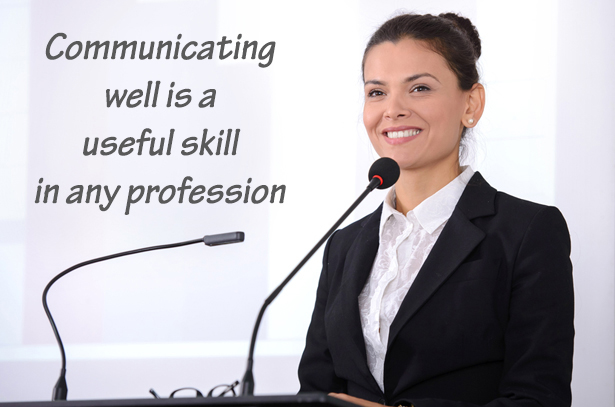
by Ying Ma, CBLPI Board of Advisors
I often encounter young women who tell me they wish to pursue a career in communications. It is a perfectly worthy goal. Communicating well is a useful skill to have in any profession, and being a communications professional can be richly rewarding. With that said, communications skills do not just materialize out of thin air. Much like playing a sport or a musical instrumental, communicating effectively and professionally takes practice. Some people have a natural talent for it; many do not. No matter which group you belong to, you can become a better communicator by putting in the requisite time and effort.
I have worked as a communications professional in the private sector and in national politics. My clients have included multinationals and political campaigns. Here are seven tips I would offer to young people who wish to pursue a career in communications.
1. Read Widely
Anyone who wishes to communicate effectively must first READ. Reading helps you gain knowledge, and knowledge helps you think and analyze more cogently.
You should read at least one national newspaper a day. Examples are the New York Times, the Wall Street Journal, the Los Angeles Times, and the Washington Post.
These papers are far from infallible, but their articles are generally better written, better edited, and better researched than those published by smaller competitors. Additionally, these major newspapers provide more than just news of the day—they provide context.
In our modern era, many of us obtain news highlights from multiple sources, including 24-hour cable news and social media. Much of it is helpful, but plenty is not. Headlines and 140 characters are just white noise if you do not know how they relate to other stories or why the content even matters. Reading—or at least skimming—a major newspaper every day helps facilitate a broader understanding of the issues, how they are connected to each other, and how they might affect your work.
Ideally, communications professionals should read constantly and widely, and should consume everything from books to journals, blogs to industry-specific newsletters. The more we read, the more we know; the more we know, the more successfully we can talk, write, and otherwise advocate on behalf of our clients.
2. Become a Better Writer
Writing is a big part of communications. Unfortunately, sloppy writing is a regular feature of the communications industry. Often, sloppy writing results from sloppy thinking. Reading widely and being regularly exposed to well-argued ideas (as discussed above) will reduce sloppy thinking, while taking other practical steps can help reduce sloppy writing. For example, you can do the following: 1) take a writing class, 2) consult guidebooks about how to become a better writer, and 3) write and rewrite.
In a writing class, you will need to put pen to paper and receive constructive criticism from your instructor and potentially your peers. This is a great way to discover what you are doing right or wrong, and what you can do better.
Consulting guidebooks will allow you to take advantage of advice from expert writers and editors. A classic guide is The Elements of Style, an elegant book widely considered to be the definitive text on the English language. Among other things, it teaches how to write with brevity and clarity, and how to avoid common mistakes.
Of course, the only way to really improve your writing is to put the tools and advice to use. All writing is rewriting, and the more you practice, the better you will get. In your spare time, write an essay, a letter, an opinion article, or whatever else that might interest you. In due time, you will get better.
3. Learn to Edit
There is a lot of overlap between writing and editing, but the two are not the same. Writing requires some amount of creativity and perhaps even specialized knowledge. It is about drawing the big picture and filling it with the relevant details. Editing is about technique, and is aimed at fine-tuning the writing that is already in place.
Learning to edit is not that different from learning to write: you will need to make use of available tools and practice. Take an editing class, learn via online tutorials, or learn from friends or colleagues.
Make sure you also use a style guide. There are a lot of technicalities in the English language that we do not think about every day. A style guide will help answer questions about grammar, usage, spelling, punctuation, capitalization, abbreviation, and all other crucial areas of writing.
Two style guides to consider are the Chicago Manual of Style and the Associated Press Stylebook. The former is the bible that governs the rules of publication, while the latter is the gold standard for news writing. If you are likely to work with books, short stories, reports, policy memos, and white papers, choose the former. If you are likely to work regularly with journalists, choose the latter. Regardless of which style guide you use, stick to it and be consistent.
However you do your editing, do not be afraid to solicit editing help for your writing. Even the best writers need an editor, whether for correcting simple mistakes on grammar or mechanics, or for reshaping the substance of the written product.
Ultimately, all ideas are better communicated when they are professionally presented. Bad writing and bad editing will undermine the message you are trying to convey. Try to avoid both.
4. Check Your Facts
Do not play fast and loose with the facts. Make sure that whatever information you release to the public is accurate. Before publication, do a Google search, double check with those who have the relevant knowledge, cross-reference with existing published materials, or seek fact-checking assistance from colleagues.
If bad writing and bad editing can undermine the written product, factual errors could fundamentally damage the integrity and effectiveness of the underlying message. Make a habit of preventing such errors from occurring.
5. Educate Yourself about Your Client's Business
Communications professionals are often called upon to speak on their clients' behalf. Hence, it behooves them to learn about their clients' businesses. If your client is a political candidate, study his policy positions and public statements. If you are working for a company or an organization, learn about its mission, its business model, and its comparative advantage. (For those who work in-house, their client obviously would be the employer.)
Many years ago, I became the public relations manager for a Nasdaq-listed company in Silicon Valley. I attended a get-to-know-you meeting with our company's public relations firm and quickly realized that the firm knew precious little about my company's business. It was deeply offensive, and the firm's work product on our behalf reflected this lack of knowledge and disinterest. Naturally, our company did not remain a client of that firm for long.
When you are working for a client, gather as much information as possible about it. Often, your client will be the best source of nonpublic information. Don't be hesitant to ask questions and don't be afraid to learn new things.
6. Do Not Substitute Your Opinions for Your Client's
A lot of young people show up at the workplace with great ambitions and big ideas. It is one thing, however, to offer ideas to the client, but quite another to think that your ideas should replace the client's.
If you work for a national political candidate, he is likely to have policy positions on issues ranging from taxes to healthcare to foreign policy to cyber security. You may think you know more than he does because you took a class or wrote a research paper. On certain narrow issues, you might be right, but that does not matter. Your job is to help him formulate and communicate his ideas, not to substitute your ideas for his.
As such, do not get upset if he is not interested in your senior thesis, or if he does not adopt your proposals. He is the candidate; you are not. If you are a junior staffer, do not assume you should be representing your candidate on national television. You do not yet have what it takes.
This is not to say that communications professionals have no right to be frustrated when their client does not heed their advice. What you should always keep in mind, however, is that your client is paying you, not vice versa. Ultimately, it is the client's positions and interests you must serve.
7. Never Stop Learning
Even seasoned communications professionals need to constantly refresh their skills. New technologies emerge and new developments occur all the time in business, politics, and beyond.
For example, social media platforms such as Facebook and Twitter have emerged as essential tools for professional communications, but ten years ago, the term "social media" was not even part of our popular consciousness. For communications professionals who did not grow up in the social media age, we had to familiarize ourselves with the new medium and hire new team members who could wield it more proficiently.
Other unforeseen technologies and platforms will no doubt continue to emerge. Remain curious and don't stop learning, and you will be well positioned to face new challenges and capitalize on new opportunities.
Conclusion
Communicating effectively and professionally is not rocket science, but it does require time and effort. Unfortunately, communications professionals have a tendency to be glib. Many do not write well or speak clearly; others do not know how to think critically; many more think communications is easy and do not take the need for self-improvement seriously.
Do not follow in their footsteps. The advice here will not guarantee success, but it will set you on a path of competence and self-respect, and it will get you started on communicating more effectively.
About the Author

Ms. Ma is a member of the Board of Advisors for the Clare Boothe Luce Policy Institute. She served as the deputy communications director for the Ben Carson for President 2016 Campaign and the deputy director of the Committee for American Sovereignty, a pro-Trump super PAC. Previously, she managed corporate communications for Sina.com, a Nasdaq-listed company, and worked on public affairs for Burson-Marsteller, one of the world's largest public relations firms.
